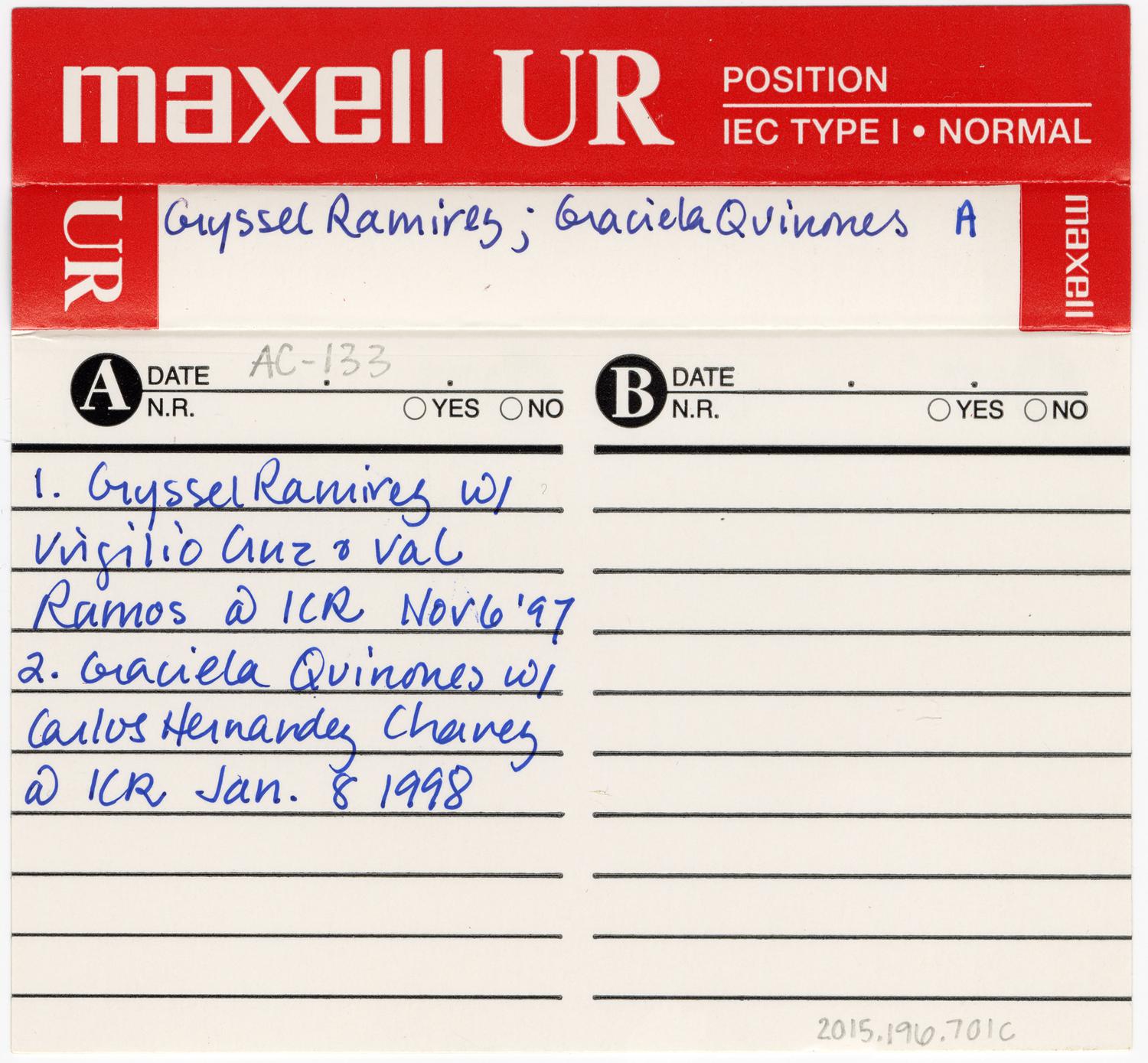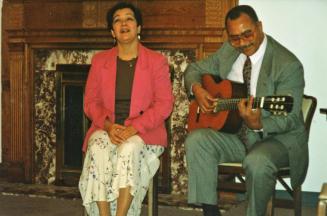Performances by Gryssel Ramirez, Virgilio Cruz, Val Ramos, Graciela Quiñones-Rodriguez, & Carlos Hernández Chávez
PerformerPerformed by
Gryssel Ramirez
(Puerto Rican)
PerformerPerformed by
Virgilio Cruz
(Puerto Rican)
PerformerPerformed by
Val Ramos
(Puerto Rican)
PerformerPerformed by
Graciela Quiñones-Rodriguez
(Puerto Rican)
PerformerPerformed by
Carlos Hernández Chávez
(Mexican-American)
Date1997-1998
Mediumreformatted digital file from audio cassette
DimensionsDuration (side 1): 43 Minutes, 10 Seconds
Duration (side 2): 4 Minutes
Duration (total runtime): 47 Minutes, 15 Seconds
ClassificationsInformation Artifacts
Credit LineConnecticut Cultural Heritage Arts Program collections
CopyrightIn Copyright
Object number2015.196.701a-d
DescriptionAudio cassette recording of Puerto Rican musicians. The first performers are Gryssel Ramirez, Virgilio Cruz, and Val Ramos performing at the Institute for Community Research on November 6, 1997. The second performers are Graciela Quiñones-Rodriguez and Carlos Hernández Chávez performing at the Institute for Community Research on January 8, 1998.
NotesSubject Note: These performance events were presented by the Inner City Cultural Development Program (later called Urban Artists Initiative), a long-term training and resources program of the Institute for Community Research and the Connecticut Commission on the Arts. Several CCHAP artists were involved in that program.Biographical Note: Graciela Quiñones-Rodriguez is a Puerto Rican educator, social worker, artist, and luthier who apprenticed with William Cumpiano (Easthampton, MA) and has built cuatros, tiples, and bordonuas. Graciela is also a cuatrista and higüera (gourd) and santos carver. She served as an advisory committee and exhibiting artist and workshop leader for CCHAP’s three Puerto Rican projects, starting as a community scholar with Herencia Taina, CCHAP’s 1998 Taino exhibit project, researching the techniques of higüera preparation and decoration for use as household utensils, ornaments with Taino or political iconography, or musical instruments. She also worked as an artist-presenter for the Massachusetts Cultural Council summer institute on Puerto Rican cultural heritage for Springfield, Massachusetts teachers. Graciela is a highly respected arts educator, woodcarver, and singer with the Connecticut Latin music group Tierra Mestiza. She is a Connecticut Commission on the Arts Master Teaching Artist and Artists Fellowship winner. As part of the Southern New England Traditional Arts Apprenticeship Program in Year 3 (2000-2001), she worked with master luthier Bill Cumpiano. Together they built cuatros, tiples, and bordonuas, older forms of Puerto Rican stringed instruments. As part of the apprenticeship they built a cuatro on the basis of a photograph of an unusual form from the early 1900's, which has a bent wood body rather than a hollowed-out base. They demonstrated their partnership work at the Lowell Folk Festival in 2000.
Biographical Note: Carlos Hernández Chávez is a Mexican musician and performer of Jazz and Latin music, playing guitar and singing with Latin musicians around the Greater Hartford area including many years with the group Tierra Mestiza. He often hosts “Porch Concerts” at his home in Harford, convening and participating in musical activities and events around the area. A muralist and a visual artist of international acclaim, his paintings and murals are on permanent display at cultural, educational, and social institutions in the U.S. and Europe and have been featured by print and electronic media in the U.S. and abroad. In addition to being a respected visual artist and educator, he is also an accomplished musician and photographer. Mr. Hernández Chávez is an active Master Teaching Artist with education districts and arts agencies and institutions across Connecticut. Since the early 1970s he has held leadership roles as advisor, co-founder, director, juror, organizer, lecturer, policy-maker, artist-in-residence, consultant, and commissioner, in many Connecticut and Hartford area organizations and institutions, among them The Connecticut Alliance of Black and Hispanic Visual Artists; the Old State House; The Park Street Festival; the Greater Hartford Festival of Jazz; Yale University's Afro-American Cultural Center; the (former) Connecticut Commission on the Arts; the Wadsworth Atheneum Museum of Art; Real Art Ways; Concerned Citizens for Humanity, Inc.; Guakia, Inc., the Evelyn W. Preston Memorial Concert Trust Fund; the Greater Hartford Arts Council, Leadership Greater Hartford, the Edward C. and Ann T. Roberts Foundation, and the Bushnell Center for the Performing Arts. He is past Chair of the City of Hartford's Commission on Cultural Affairs and past President of the Mariachi Academy of New England, Inc.
Biographical Note: Virgilio Cruz, master cuatro player and composer of décimas (an old poetic form with ten lines of eight syllables each) first learned traditional music from trovadores (folk poetry improvisors) and from his father who played and built cuatros, the 10-stringed guitar-like instrument. After moving to Hartford in 1986, Virgilio established a community traditional music school and orchestra, La Primera Orquesta de Cuatros. Through the school many local Puerto Ricans became good singers, cuatro, guiro, and guitar players as well as trovadores. Several evenings each week after work, people would gather in Hartford’s Puerto Rican neighborhood to take classes in cuatro playing, traditional musical forms such as the seis and aguinaldo, and folk singing taught by Mr. Cruz and others skilled in those traditions. More than just a learning experience, the school brought many people together around the common social bond of música jibara at a time when Hartford offered few cultural activities for Latinos. The school gave rise to La Primera Orquesta de Cuatros, a large performing group of cuatristas and singers which would hold regular concerts in local churches and halls.
Like the school, Canto Isleño was formed by senior members of the Orquesta to fill a void in the cultural life of Hartford's largest ethnic group and to expand appreciation for traditional music and poetry. Canto Isleño performed Puerto Rican música jíbara, the songs and poetry of the island's mountain farmers. Their repertoire included folk forms such as Puerto Rican seises and aguinaldos, along with joropas, marumbas, and semi-classical mazurcas, valses criollas and danzas. In 1998, Virgilio moved back to Puerto Rico, a long-time dream of his. He has produced a book of décimas based on the vernacular speech of Puerto Rican campesinos.
The school ended after Virgilio Cruz returned to Puerto Rico, but many musicians who had been trained there continued to play regularly at venues around Connecticut such as Peter’s Café, Los Hermanos, and La Comerio on Park Street in Hartford, and the Puerto Rican Society in New Britain. Amor y Cultura members Alfred Rivera and Joe Diaz performed in the Orquesta and also in Canto Isleño, the school’s select performing group. Ramon Arroyo, a singer who sometimes performs with Amor y Cultura, competed as a trovador in the school’s annual Concurso, a traditional competition for oral composition of the décima song form.
A master cuatrista and teacher, Virgilio is also a poet, accomplished in composing the words of decimas, seises, and aguinaldos (specialized poetic forms in Spanish) which he sets to music. These become both folk songs and popular songs which he sings himself or arranges for Canto Isleño. He was First Prize Winner as Composer, at the Segundo Festival de la Voz y la Cancion, San Lorenzo, Puerto Rico and Semi-Finalist Composer at the XI Festival de la Cancion de la Nueva York in the late 1980s. Virgilio is an experienced performer who can explain as well as perform music in both English and Spanish. The concept of a roving singer/songwriter skilled at extemporaneous song composition is so much a part of Puerto Rican folk music. Virgilio and others developed and presented several “Concurso de Trovadores de Nueva Inglaterra" events, traditional competitions in jibaro poetry creation, in Hartford, with support from the national Endowment for the Arts.
Virgilio served on the advisory committee for the Connecticut Heritage Arts Program, and CCHAP served as mentor to La Primera Orquesta de Cuatros, advising on grant writing, organizational development, and marketing/promotion, through a Connecticut Commission on the Arts program. Canto Isleño performed at Charter Oak Cultural Center during the first traditional arts performers series organized by CCHAP in 1995-1996, and was selected for the Connecticut Commission on the Arts Touring Roster. In 1992, the Orquesta was a participant in the New England Foundation for the Arts (NEFA) Newcomers Project, a technical assistance program for artists from recently arrived communities. In 1995, Virgilio was selected as a mentor/teacher as part of the New England Foundation for the Arts Apprenticeship Program. He and the group Canto Isleño are featured on the 1998 CCHAP/WNPR-produced CD "Sounds Like Home."
“I am a musician and poet in the folk traditions of Puerto Rico. I play the cuatro and compose both popular and folk songs. I also write folk poetry in the vernacular of Puerto Rican campesinos as well as Spanish language poetry. My introduction to music came from my father, a luthier who also played cuatro. Later I took lessons in music theory and practice from private instructors and at the Institute for Culture in San Juan where I joined their orquesta. After moving to Hartford in 1986, I formed the performing group Canto Isleño. Several community members asked me to teach cuatro which I began to do, later adding classes in guitar and folk singing. This has developed into regular evening classes and the establishment of La Primera Orquesta de Cuatros de Hartford.
I have been teaching cuatro, guitar, and folk music to a variety of age groups for several years. Primarily my teaching experience has been with adults in both a one-on-one lesson format and in a classroom setting. The Institute for Culture in San Juan, where I received musical training, uses a teaching method I feel is very effective: having experienced students as part of a class including less experienced ones, helping to pass on their knowledge and motivation directly to the new students. I am collaborating with a member of my folk singing class, a trained opera singer, on a teaching guide for Puerto Rican folk songs - El Trovador Boricua. Teachers will have this as a resource on the words and written music of the songs so they can use it in the classroom with a trained musician.”
Biographical Note: Gryssel Ramirez is a Puerto Rican professional singer who often performed in New Haven and Hartford with La Primera Orquesta de Cuatros and Canto Isleño, two excellent traditional Connecticut Puerto Rican music groups, when she lived in Connecticut in the 1990s. Now based in Puerto Rico, she has performed around the Caribbean with musicians including Chucho Valdes.
Biographical Note: Val Ramos is a guitarist who leads the music and dance group “Val Ramos Flamenco Ensemble,” a highly regarded performance group established in 1994. Their style can be described as “Nuevo Flamenco” and “Flamenco Fusion,” incorporating contemporary elements into the tradition. Based in Connecticut, they tour widely in New England and also internationally. They have produced three albums.
Additional materials exist in the CCHAP archive for these artists.
Cataloging Note: This project was made possible in part by the Institute of Museum and Library Services MA-245929-OMS-20.
Status
Not on viewGraciela Quiñones-Rodriguez
2004 February 21
Jampa Tsondue
2018 March 10
Glaisma Pérez Silva
July 1999













